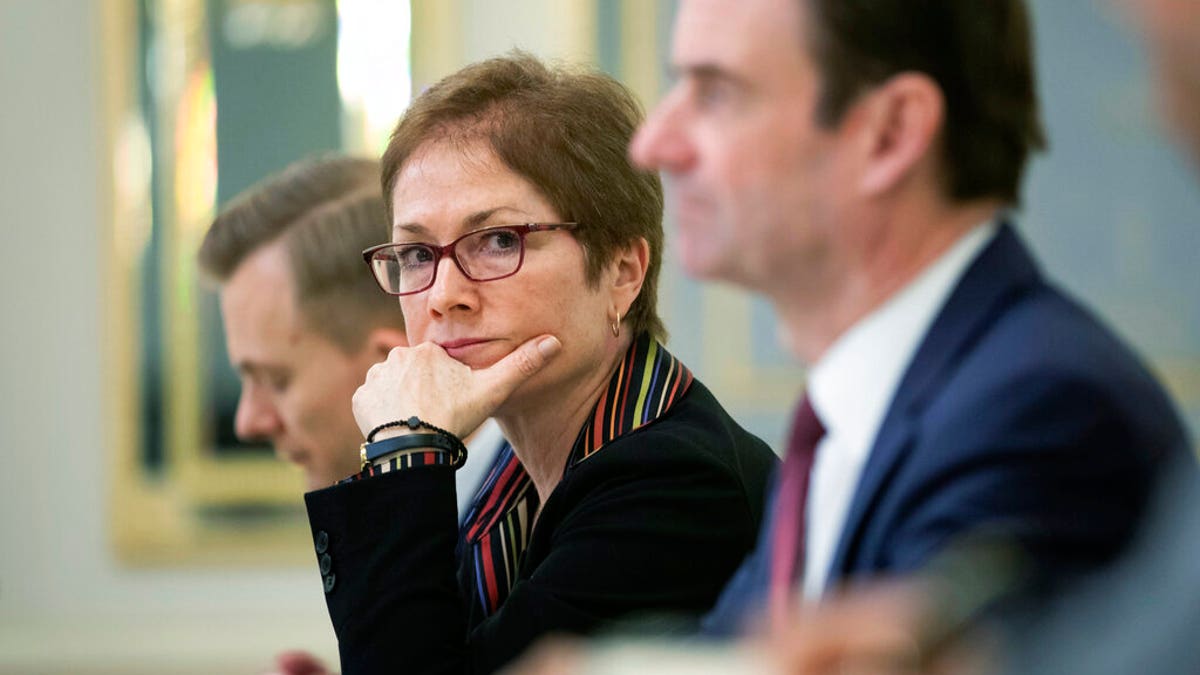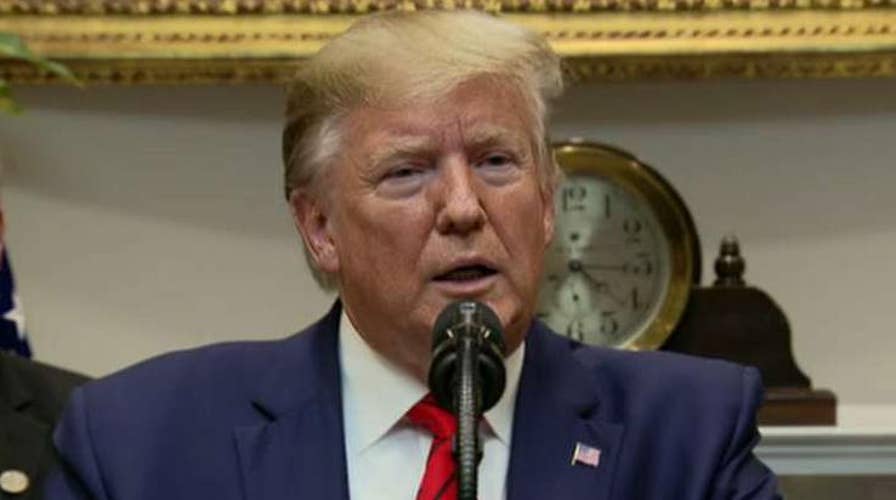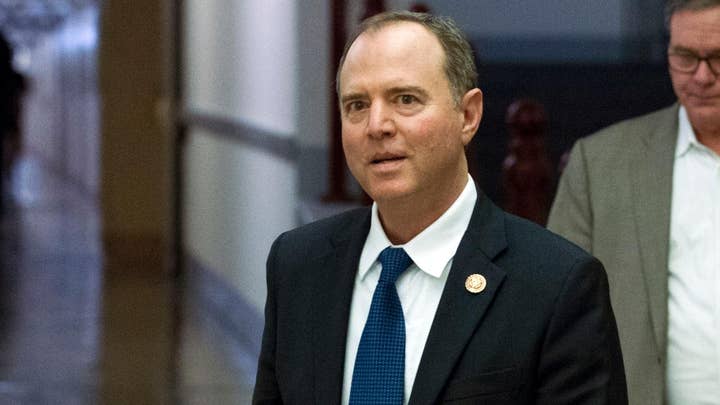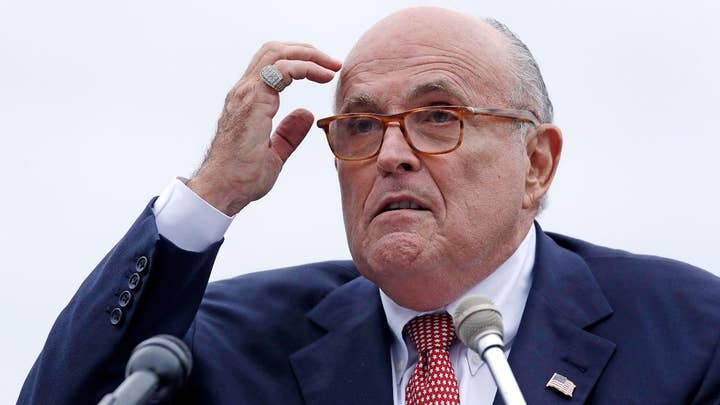Gregg Jarrett: Trump is 'certainly entitled' to ask Ukraine to investigate the Biden family
Fox News legal analyst Gregg Jarrett says it was a 'normal thing' for our government to ask for cooperation to get facts and evidence.
Marie Yovanovitch, the former U.S. envoy to Kiev and someone President Trump has privately called "bad news," is scheduled to sit for a potentially explosive transcribed interview with lawmakers and staff on Capitol Hill on Friday as Democrats intensify their impeachment inquiry.
But after the White House abruptly blocked U.S. Ambassador to the E.U. Gordon Sondland from testifying shortly before his planned appearance on Tuesday, it remained unclear whether Yovanovitch would appear at all. The White House announced this week it would not comply at all with what it called Democrats' "unconstitutional" proceedings.
However, multiple sources told Fox News late Thursday that Sondland will indeed appear for a transcribed interview before House investigators next Wednesday, defying the State Department. "Notwithstanding the State Department’s current direction to not testify, Ambassador Sondland will honor the Committees’ subpoena, and he looks forward to testifying on Thursday," read a statement released by Sondland.
It also comes amid some internal drama at the State Department. Fox News has confirmed that Michael McKinley, a senior adviser to Secretary of State Mike Pompeo, resigned this week.
As of now, Fox News is told that the plan is for only House Intelligence Committee staff and members to pose questions to Yovanovitch, should the ex-diplomat show up as scheduled at 10 a.m. ET. No staffers from the Foreign Affairs or Oversight Committees, majority or minority party, are expected to be able to ask questions.
But Republicans will be allowed to have a second aide in the room after complaining last time, Fox News is told. It's unclear how long the session is likely to run.
Trump and his surrogates have painted Yovanovitch as a rogue State Department employee with an anti-Trump political bias. Her ouster in May came amid alleged attempts by Trump attorney Rudy Giuliani to press Ukraine into investigating Democratic presidential candidate Joe Biden and his son. Those efforts triggered the impeachment inquiry.
The former New York mayor labeled Yovanovitch a political hack bent on undermining Trump's efforts, charges that apparently resonated with the president.

Former U.S. Ambassador to Ukraine Marie Yovanovitch, center, is set to testify on Friday on Capitol Hill. (Mikhail Palinchak, Presidential Press Service Pool Photo via AP)
On Thursday, federal prosecutors unsealed an indictment alleging in part that two donors to a pro-Trump fundraising committee were engaged in lobbying efforts in the U.S. on behalf of a Ukrainian politician to seek Yovanovitch's ouster.
The Soviet-born defendants, Lev Parnas and Igor Fruman, are U.S. citizens who helped Giuliani's efforts to pursue an investigation of Joe Biden's dealings in Ukraine.
Meanwhile, Ukraine's president insisted Thursday that he faced "no blackmail" from Trump in the July 25 phone call between the two men that led to an impeachment inquiry.
Volodymyr Zelenskiy said for the first time that his country will "happily" investigate the conspiracy theory pushed by Trump that it was Ukrainians, not Russians, who interfered in the 2016 U.S. presidential election. And he encouraged U.S. and Ukrainian prosecutors to discuss investigating the Ukrainian gas company Burisma Holdings.
GIULIANI ASSOCIATES TIED TO UKRAINE PROBES INDICTED ON CAMPAIGN FINANCE VIOLATIONS
Biden has acknowledged that in spring 2016, when he was vice president and spearheading the Obama administration's Ukraine policy, he successfully pressured Ukraine to fire top prosecutor Viktor Shokin. At the time, Shokin was investigating Burisma Holdings — where Hunter had a lucrative role on the board despite limited relevant expertise. The vice president threatened to withhold $1 billion in critical U.S. aid if Shokin, who was widely accused of corruption, was not fired.
The impact of any news from the interview with Yovanovitch may be blunted temporarily because both the House and Senate formally remain on recess until next Tuesday. The House Democratic Caucus and Republican Conferences will hold their formal meetings and press conferences on Wednesday morning.
"The former ambassador from the United States, the woman, was bad news."
Yovanovitch, a State Department employee for 33 years who also led U.S. embassies in Kyrgyzstan and Armenia, has drawn praise from colleagues for her past work on international affairs.
She is "a top-notch diplomat, careful, meticulous, whip-smart," and unlikely to have badmouthed Trump, either to Ukrainian officials or her colleagues, said John Herbst, a predecessor as ambassador in Ukraine who worked alongside Yovanovitch there in the early 2000s.
That reputation is all but impossible to square with what some view as a smear campaign, capped by the Trump administration's removal of Yovanovitch from her post this year.
BIDEN CAMPAIGN SEEKS TO BAR GIULIANI FROM TV ... THEN GOES AFTER NEW YORK TIMES
"The former ambassador from the United States, the woman, was bad news," Trump told Ukraine President Zelenskiy during their July 25 call, according to a partial transcript released by the White House. "She's going to go through some things."
Currently a State Department fellow at Georgetown's Institute for the Study of Diplomacy, Yovanovitch was declining all requests to speak with reporters in advance of her planned testimony.
Yovanovitch, 60, was raised in a household that helped prepare her for a career in international relations.
Born in Canada to immigrant parents — her father from the former Soviet Union, her mother from Germany — she grew up speaking Russian at home. The family moved to Connecticut when she was a young child, and she later became a U.S. citizen.
"Like so many, including those in the Ukrainian-American community, my parents' lives were changed forever by Communist and Nazi regimes," Yovanovitch said during a Senate confirmation hearing in 2016, attended by her 88-year-old mother. "They survived poverty, war and displacement, and finally arrived in the United States, with me in tow, in search of freedom, opportunity, dignity and accountability."
Yovanovitch attended Princeton, where she majored in history and Russian studies. She joined the Foreign Service six years later, working as deputy director of the Russian desk before being posted to Canada, Russia, Great Britain and Somalia.
From 2001 to 2004, she worked as the U.S. deputy chief of mission in Ukraine, as second in charge to Herbst, before being named ambassador to Kyrgyzstan, then to Armenia. She returned to Ukraine after President Barack Obama nominated her to be ambassador in 2016.
FOX NEWS POLL SHOWS RECORD SUPPORT FOR IMPEACHMENT
She arrived in Kiev two years after Russia's forced annexation of Ukraine's Crimean Peninsula and its continuing military intervention. As an envoy, Yovanovitch sought to reassure Ukrainian officials of U.S. support, while pushing them to root out widespread corruption.
"The old oligarch system is still clinging to life, and corruption is its life support," she said in a speech in January to new graduates of the Ukrainian Leadership Academy. "Ukraine must continue to pursue economic reforms in line with European standards and fully empower all of its anti-corruption institutions."
Some Ukrainian officials, including the country's top prosecutor, bridled at the pressure from the U.S. ambassador.
In March, the prosecutor, Yuriy Lutsenko, claimed that Yovanovitch had given him a list of people he should not prosecute. The State Department dismissed the statement as baseless and Lutsenko later recanted his claim.
But critics, led by Giuliani, accused her of working to undermine Trump's interests. "The embassy in Ukraine was a 'Hillary Clinton for president' office. And they were looking to dig up dirt on President Trump," Giuliani said. "There was a lot more collusion with Ukraine than in Russia, where there doesn't appear to be any. They were trying to bring Trump down."
As part of Senate confirmation hearings to ambassadorial posts, Yovanovitch reported that she made several small contributions to Democratic candidates in the early 2000s, but none more recently.
She returned to Washington in 2012 and 2013, serving as the State Department's day-to-day contact with U.S. officials in Europe. Lee Feinstein, the U.S. ambassador to Poland at the time, recalled extended conversations with Yovanovitch about how to calibrate negotiations over missile development and a continuing U.S. military presence there.
CLICK HERE TO GET THE FOX NEWS APP
"She was always the kind of person who was very, very supportive of her ambassadors and looking to help them do their jobs better," said Feinstein, now dean of the Hamilton Lugar School of Global and International Relations at Indiana University. "Never somebody who was trying to pursue her own agenda."
Fox News' Nick Kalman, Chad Pergram and The Associated Press contributed to this report.
















































